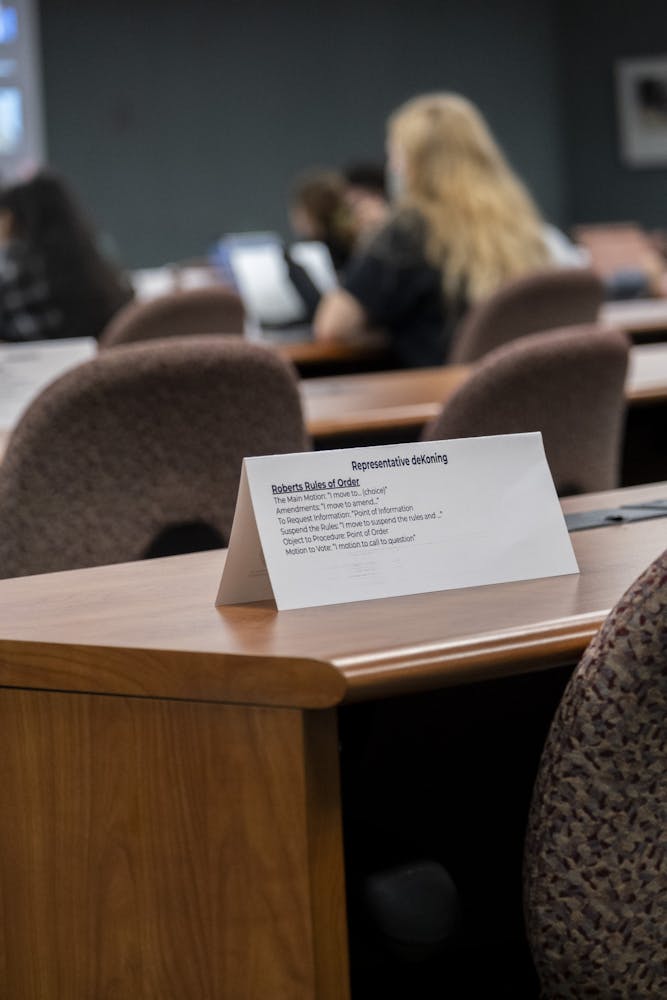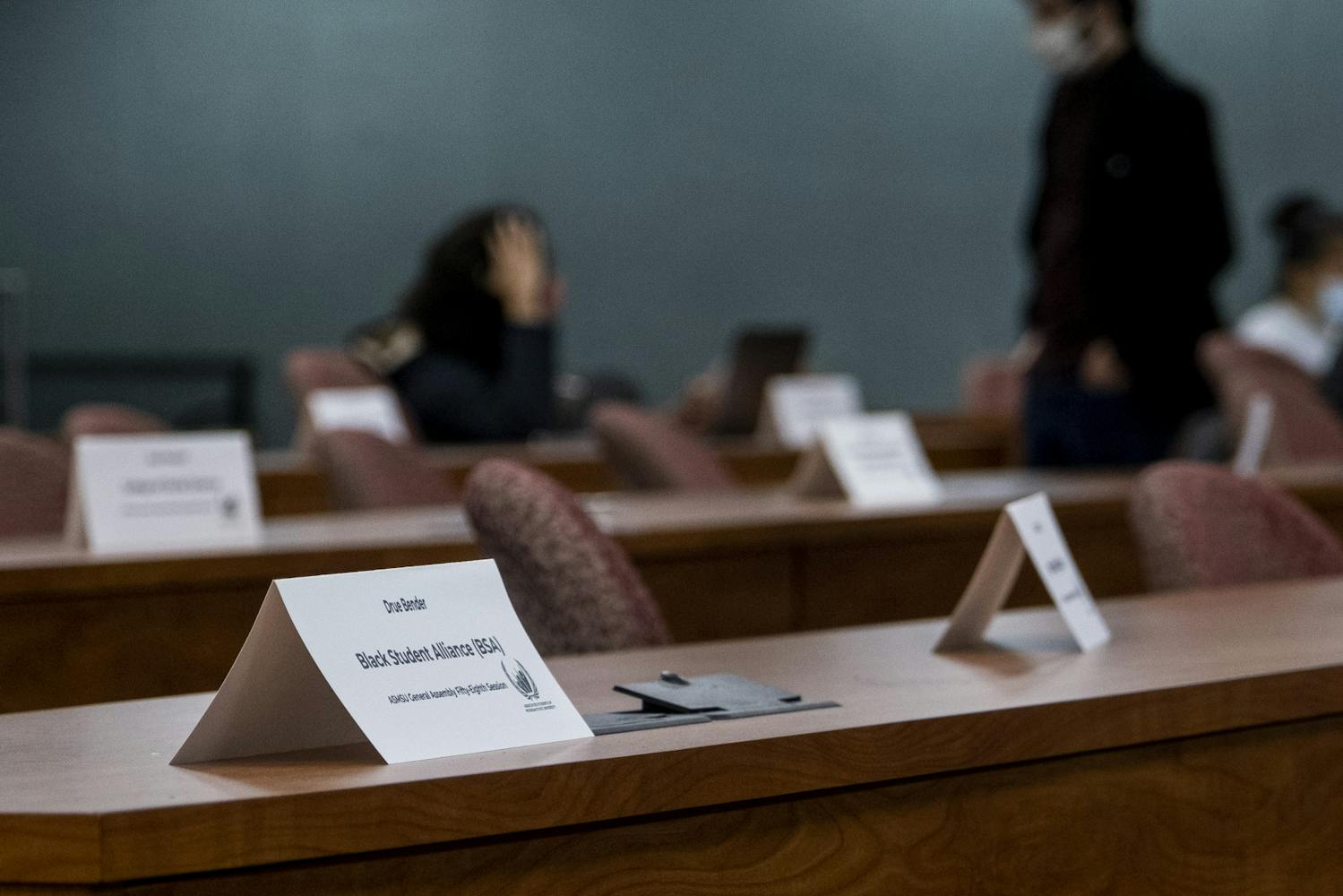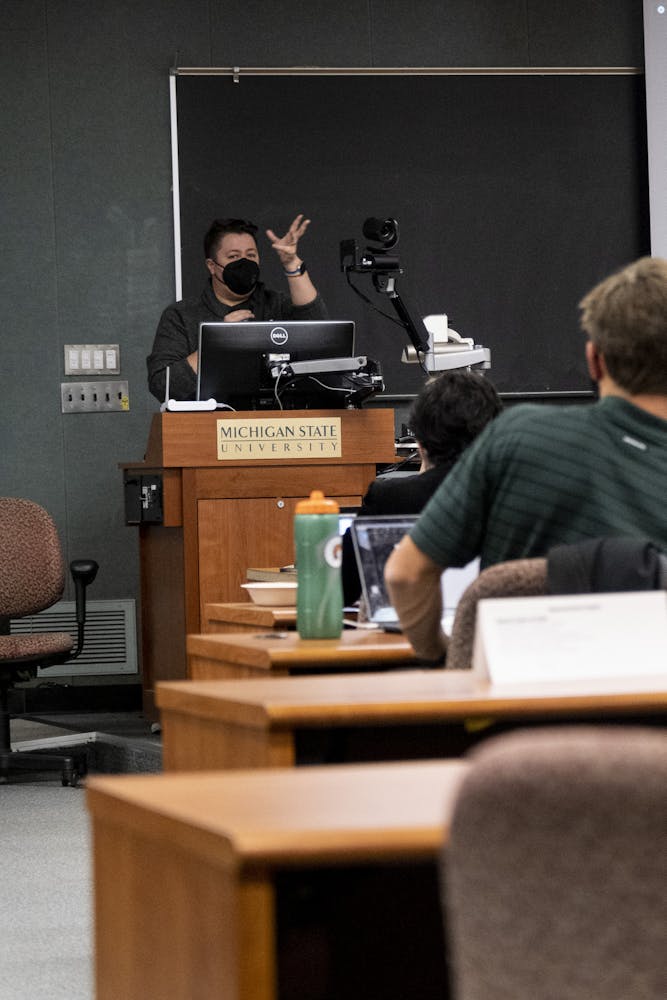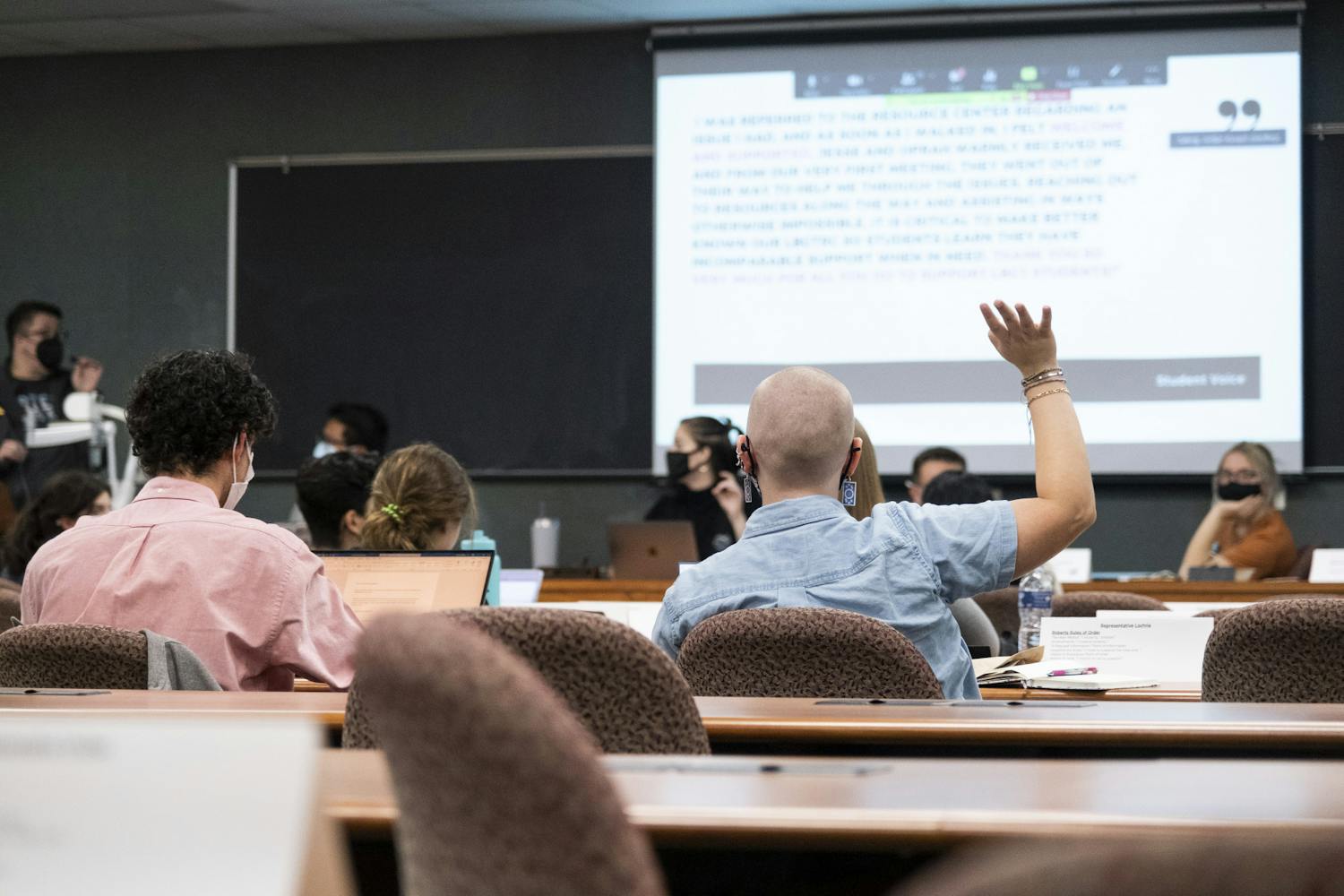“The recreate is designed to do two things,” Gore said. “One is to provide the capital to replace our current facilities right now and also for operational costs of IM rec.”
The general amount fund at the start of the meeting was $158,474.57, and after four funding bills were passed, it brought down the funding to $137,193.92.
VPGA Elect Ishaan Modi
ASMSU announced on Dec. 7 there were two VPGA candidates running to replace former VPGA Matt Apostle’s position due to his resignation at the Nov. 5 GA meeting.
Former state liaison Modi and College of Social Science Rep. Devin Woodruff both ran for the VPGA role and were asked the same four questions. These questions concerned how they would collaborate with other ASMSU departments, their potential plans or advocacy for COVID-19 resource equity and more.
Modi won the majority of the GA votes.
“I don’t want the words that I’ve said just to be words,” Modi said. “I want them to be actions. … I want to work with each and every one of you, and I’m going to try and also work to bridge some of the gaps that exist in this organization so that we have a more equitable organization but as well just better policy advocacy.”
Furloughed student staff
This bill was written in response to Bill 57-30, which created a $33,000 fund in 100 gift cards to give support to furloughed MSU student staff members after being fired amidst the COVID-19 pandemic.
“These gift cards are about to expire ... and this bill would donate them to a food bank,” Alliance for Queer and Allied Students Rep. Cameron Lochrie said. “I think it’s a perfect cause. I think this is the perfect time to do that.”
Bill 58-36 passed unanimously, and the remaining 34 gift cards will be distributed to the MSU Student Food Bank.
Allocation to MSU Safe Place
Introduced by James Madison College Rep. Sophia Strach, Bill 58-37 unanimously passed, allocating $5,000 to MSU Safe Place.
Student Housing Cooperative Rep. Sky Stillwell said Bill 58-37 was written to show survivors in the greater East Lansing area ASMSU takes a stance in their feelings and fully supports them.
“The best thing we can do to show people that we care as an organization is by putting money towards really significant, really important efforts,” North American Indigenous Student Organization Rep. Gabriel Gurule said.
Stillwell also mentioned MSU Safe Place has helped them get out of housing contracts on campus and expressed support for the bill.
Allocation to MSU Center for Survivors Emergency Fund
First introduced in Bill 57-7, Bill 58-38 is similar to Bill 58-37 but allocates $5,000 to the MSU Center for Survivors Emergency Fund. It also passed unanimously.
Support student media!
Please consider donating to The State News and help fund the future of journalism.
“This is a position where we can do something that raises awareness of issues that affect our classmates,” Gurule said, “That affect the Lansing and East Lansing area, and it can give us all, as an organization, something to do besides just sending thoughts, prayers or kind messages,” Gurule said.
The Center for Survivors’ Emergency Fund removes financial roadblocks and aims to prevent students from failing to receive healing due to fees tied to physical and mental health resources.
Allocation for Association of Fraternal Leadership & Values Conference
This bill, introduced by National Pan-Hellenic Council, or NPHC, Rep. Fatoumata Barry, allocated $11,280.65 to the Multicultural Greek Council, or MGC, and the National Panhellenic Greek Council so the councils could attend the Association of Fraternal Leadership & Values, or AFLV, Conference.
The AFLV Conference is one of the largest gatherings in the country of fraternity and sorority students. There will be speakers, educational sections, pre-conference workshops, and it will be an opportunity for Greek life leaders to network with one another.
“Due to the pandemic, we weren’t able to fundraise along with our organizations are pretty small,” Barry said. “In total, with both councils together, we make less than 300 members. ... Making those funds for helping us attend would mean a lot.”
There was immediate disagreement from College of Agricultural and Natural Resources Rep. Lauren Sawyer, who believes there currently are more timely issues over funding for the AFLV Conference.
Gurule echoed similar criticisms with concerns on the pricing of the funding.
“I recognize that there are benefits to Greek life,” Gurule said, “I, myself, am a member of it, and I recognize that there are skills that you can learn at leadership conferences. However, when we consider the price tag of almost $11,000, I, personally, cannot stump that.”
College of Arts and Letters Rep. Carl Austin Miller Grondin said he understands there are other pressing topics but highlighted he believes MGC and NPHC are underrepresented, especially in Greek life.
“I do think that's very important for us as a student government to help support these groups, make sure their voices are heard in a very white-dominant group,” Grondin said.
With much discussion, the bill passed with 25 votes in favor.
Advocate ABTS taxable income resolution
Bill 58-47, passed unanimously, is a resolution to sponsor The Association of Big Ten Students, or ABTS. The resolution calls for ABTS to support any Big Ten Student Government that desires to advocate for the disqualification of room and board scholarships as taxable income.
Advocate to double Pell Grant
This bill is also a resolution to sponsor an ABTS resolution which calls for ABTS to support a Big Ten Student Government that desires to advocate for the U.S. Congress to double the Federal Pell Grant award.
Bill 58-48 passed unanimously.
Advocate satisfactory/non-satisfactory grading option
Bill 58-45, introduced by International Student Association Rep. Nikunj Agarwal, advocates for the reintroduction of the satisfactory/non-satisfactory, or S/NS, grading option for fall 2021 and spring 2022.
S/NS was first introduced to MSU students in fall 2020 due to the COVID-19 pandemic and was pushed by former ASMSU President Abii-Tah Bih and 12 Big Ten student body presidents as well.
Vice President for Academic Affairs Aaron Iturralde announced he received an email from the Office of the Provost that morning stating that MSU would not be offering S/NS during the fall 2021 semester; however, the Office of the Provost is interested in working to see if it can be implemented for spring 2022.
Noticing the administration agrees to debate for S/NS for spring 2022 but shut it down for fall 2021, College of Business Rep. Kevin Kraef was in full support of this bill.
“We have no idea what’s going to happen next semester,” Kraef said. “In fact, because it will presumably get warmer in the spring, it might be better next semester ... Why would we stop the fight when they’re saying, ‘We’re open to it next semester but not this semester,’ likely only because of logistical things and that screws over us as students, and we’re the stakeholders here so we should be fighting for this with everything we have with the limited time we have.”
College of Veterinary Medicine Travis Boling supported the bill but brought up their constituents were concerned that veterinary schools would not accept courses if the students chose to use S/NS.
Strach understands this bill's concerns but has also heard from their constituents who believe using S/NS will superficially inflate GPAs and give students a false sense of security.
However, College of Natural Science Hady Omar recounts last year; many colleges accepted students’ S/NS grading, including all six medical schools in Michigan.
“It’s just a matter of fact that the more schools that you see doing S/NS,” Omar said, “The more push that graduate students are going to have to get to accept the S/NS ... It’s just more of a push versus, ‘They’re not going to do it anyway,’ because they did it last year because it was widely accepted, the S/NS, throughout undergraduate schools.”
After much debate, Bill 58-45 unanimously passed.
Reforming of MSU’s Credit/No Credit
Introduced by James Madison College Rep. Shaurya Pandya, this resolution advocates for the reforming of MSU’s Credit/No Credit, or C/NC, grading policy and was passed unanimously. Black Student Alliance Rep. Josh Dorcely seconded the bill.
“When the University made a promise for a more typical fall semester, students weren’t expecting as much and these other semesters students’ voices weren’t heard and they weren’t taken into account,” Dorcely said, “I think this bill is a perfect segway to having a better relationship between the administration and students so that our voices are better heard.”
Advocating for free menstrual products in EL bathrooms
This bill was developed when vice president for student allocations Harsna Chahal brought up the idea of putting free menstrual products in local public schools to the East Lansing City Council.
On Nov. 15, Ann Arbor was the first city in Michigan to require menstrual products available in all public restrooms.
With Ann Arbor in mind, Chahal’s ideas developed into putting free menstrual products in all East Lansing public restrooms, including men's restrooms, for which Bill 58-41 is advocating.
Advocate to increase Michigan appropriations
Bill 58-42 advocates for base increases in Michigan appropriations to MSU and a lower tuition cap.
Introducer College of Education Rep. Ella Woehlke was previously in the Zoom meeting; however, she had left the call.
As a result, Bill 58-42 was officially tabled.
Advertising MSU Center for Survivors’ emergency free healthcare
Introduced by Strach and seconded by Kraef, Bill 58-43 advertises MSU Center for Survivors’ emergency free healthcare on ASMSU social media.
"I think this is a really important bill because especially a lot of people aren’t aware of that, and people that are affected by this have already gone through it enough,” Kraef said. “They shouldn’t have to go through even more medical bills especially when there’s free healthcare available.”
Bill 58-43 unanimously passed.
Advocated the emergency contraceptive pill
This bill advocates for providing the emergency contraceptive pill, or ECP, in the neighborhood clinics, in a centralized location on campus or be made readily accessible to students.
The ECP is already sold at the MSU Health Care Pharmacy for $10. The next closest option is a $50 pill at Target or Walgreens, said Strach.
“This is an important bill,” Gurule said. “It’s a healthcare issue. It provides Plan B on campus where if students do not have access to cars, transportation or anything like that they’re able to get this in an affordable way.”
The last bill of the night, Bill 58-44, was passed unanimously.
Discussion
Share and discuss “ASMSU 5-hour long GA meeting, 12 bills passed” on social media.













